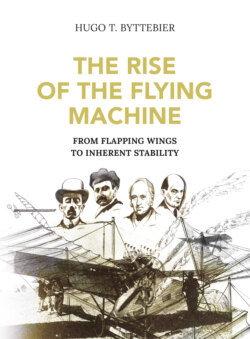Читать книгу The Rise of the Flying Machine - Hugo Byttebier - Страница 20
На сайте Литреса книга снята с продажи.
ОглавлениеPénaud’s Tragic End
The story of Pénaud’s subsequent efforts on behalf of dynamic flight is a sad one. He became increasingly detached from his colleagues in the Société de Navigation Aérienne and in 1876 resigned from his position as archivist and from the committee, resigning altogether in 1879. His successes with his flying models, his talents and his force of mind had evoked jealousy rather than admiration, a not uncommon occurrence in the history of mankind. He became bitter, quarrelled with his family and his health became further impaired.
Pénaud was left with only the hope of bringing his aeroplane project to fruition. For that he needed help and money but instead he found himself sliding into the situation similar to the one that he had perceptively ascribed to Sir George Cayley. He, too, was not understood, and was neither encouraged nor helped although fortunately his inspirational ideas were not forgotten entirely.
He thought he had found a man who could help him and began to keep company with Henry Giffard, who in 1852 had been the first person to design and fly a steam-powered dirigible airship. In the course of his experiments Giffard had developed and patented a water-injector for steam generators. His injector was a success and enabled him to amass a fortune. Here was just the man, thought Pénaud, someone rich and aeronautically minded who would be able to assist him with his projects.
But Giffard had become a lonely, ill misanthrope, and moreover, the times appeared to favour the airship for which Giffard had more sympathy and which had made him famous. Pénaud, in desperation, became more and more insistent, with the inevitable result that Giffard closed his door to him.
This, to Pénaud, was the end. He put all his aeroplane projects and manuscripts into a little coffer in the form of a casket, added a note that eight days later he would be dead and delivered the funereal package at Giffard’s home.
There was no reaction from Giffard and eight days later, on 22 October 1880, Pénaud shot himself in a fit of acute depression. This tragedy triggered another, because Giffard, possibly feeling himself partly responsible for Pénaud’s death, withdrew even further from the outside world, eventually committing suicide by inhaling chloroform.
